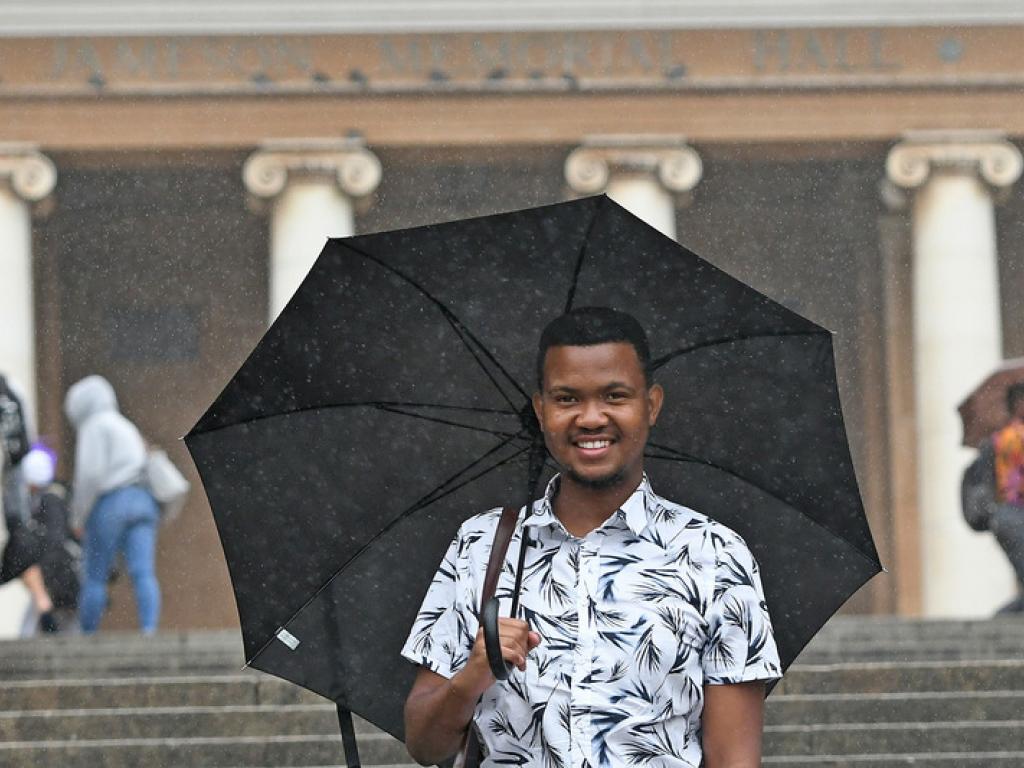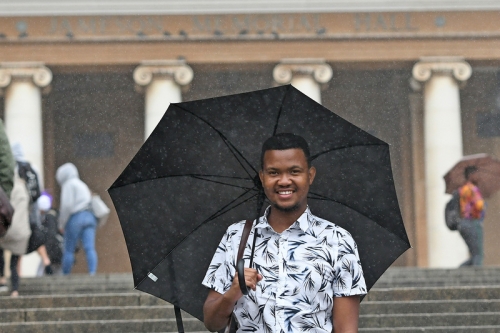‘This is my mother’s graduation’


Ntebogang Segone says his graduation belongs to his mother.
There are many parts to Ntebogang Segone’s graduation story: Small-town boy heads to the Mother City to pursue his academic dreams. Or, comeback kid proves he deserves his place at the University of Cape Town (UCT). Possibly: How the student leader managed to juggle it all. But, ultimately, Segone’s 17 April graduation is all about one woman.
Reflecting on a recent conversation with a friend, Segone said there are certain things that young, black students need to accept do not belong to them. One of these is graduation.
“My graduation is not for me … this graduation is my mother’s,” the proud Bachelor of Science (BSc) graduand said.
His mother, Lettie Segone, has always been his number one supporter, and this degree is her return on investment.
Despite growing up in Vuyolethu Shelters in Kimberley with no electricity and just three communal taps shared between 45 shacks, Segone best remembers his mother’s resilience.
On her domestic worker’s salary, she single-handedly raised seven children – her two and her sibling’s five. When she lost her job, she joined a stokvel so that there was always food in the house like tinned fish, baked beans and chicken on Sundays.
“One could say that I lived a very poor life, but for me … I lived a good and happy life,” he recalled.
His mother also stretched her salary to ensure her children enjoyed access to quality education at Kimberley Boys’ and Girls’ high schools.
It was there that Segone thrived, particularly in mathematics for which he received a distinction in matric. His results ensured him a place at UCT.
A place to call home
But like many students, he struggled to secure funding for tuition, accommodation and food. Immediately after receiving his matric results, Segone was in and out of the Northern Cape Premier's office seeking assistance. All along, Mam’Lettie was there for support.
“I said to God, if I get the funding, this is your sign to tell me [I’m] going to UCT.”
Fortunately, because of a long working relationship with the Premier’s Office, which included co-founding a tutoring programme, Segone was able to secure R70 000. While this wasn’t enough to cover all his expenses, he saw it as “a sign from God”.
“I said to God, if I get the funding, this is your sign to tell me [I’m] going to UCT.”
With the funding, his mother’s blessing and the promise of temporary accommodation with his friend Prince Nwadeyi, Segone took the bus from Kimberley to Cape Town, the longest trip he had made on his own.
While on the waiting list for a place in residence, Segone stayed with Nwadeyi. He ate jam sandwiches most days with the occasional dining hall leftovers as a treat from fellow students.
As orientation week (O-Week) approached and still without a place to call home, Segone considered off-campus accommodation. But the cheapest room he could find was R3 000 a month. Although his mother offered to pay – it was R600 more than her monthly salary – Segone couldn’t accept her generosity.
Instead, he decided to enjoy O-Week. If, by the end of it there was still no accommodation, he’d return to Kimberley with, at the very least, memories of a fun week at UCT.
A few days before the start of term, he heard he’d got into Kilindini Residence. But the biggest test was yet to come.
Second chance
At registration, Segone was surprised to discover that he needed to choose a second major and electives. Without much thought or time, he chose physics as his second major.
“I came here thinking that I was only going to do maths,” he said, pointing to the lack of preparedness that can come with being the first in your family to enrol at a university.
“It just prepared me for destruction … I was doing something that I hated.”
“There is just this ongoing cycle of poverty in my family and I need to break it.”
Faced with courses he had felt rushed to choose, along with little understanding of how the university functioned and its support structures, Segone was academically excluded in his first year.
He knew he could do better, but his application for readmission was unsuccessful. Once he found out the reasons, he approached Professor Hugh Corder who was dealing with his case. He laid bare the realities of his situation.
“I just poured my heart out to him. I explained that this degree is not for myself, it is for my family as well.
“There is just this ongoing cycle of poverty in my family and I need to break it.”
On Corder’s advice, Segone spoke to the Faculty of Science’s assistant dean, Associate Professor David Gammon. Two days later, he received an email saying he had been reinstated on a probationary basis.
“Basically, I had six months to prove to the university that I deserved to be here.”
It was time to shine.
He changed his academic programme, swapping physics for a politics and governance major, stuck to a timetable and took full advantage of lectures, tutorials and other support structures.
Outside of academics, he served as co-chair of the Institutional Forum and successfully ran for the Studentsʼ Representative Council under the campaign slogan, “I represent you, I am you”. During their tenure, the SRC helped raise over R2 million for students in financial difficulty.
“I was like, I have to show off. You give me a second chance... honey, I will smash it.”
Comeback kid
By the end of his six-month probation, Segone had proven to UCT that he was indeed “worthy”.
He finished the probation period with an 80% average, attended two international leadership programmes, was elected president of the Black Management Forum, and finished the academic year with a 70% average.

After his six-month probationary, Segone achieved an 80% average.
And come 17 April, he will graduate on the Dean’s Merit List in recognition of constant academic excellence.
“When I saw my name on the Merit List I was shook. It is one of the greatest achievements,” he said.
“As a black individual, you need to understand that you are here at the university to get a better job, so you can provide for your family.”
Segone has since started his honours in public administration and policy. And while he would like to study further, he plans to enter the workplace as soon as he graduates again in a year’s time.
“I’m black at the end of the day. As a black individual, you need to understand that you are here at the university to get a better job, so you can provide for your family.
“I would love to study further but in reality, as a poor person, I just don’t have the luxury.”
Should there be a way he can study further and send money home, Segone would certainly consider a longer life in academia.
But for now, he’s trying to play catch-up with his family on graduation preparations.
So far, six family members will join the celebrations in Cape Town. Among those attending are his mother and his sister. Their plans for the family’s first university graduation began as early as January 2017.
“They were talking about outfits; how great it’s going to be… They are so excited.”
Segone also has one more obstacle to overcome – finding his own perfect outfit.
“Last year, when my friends were graduating, I was like, girl, boy, you don’t have your graduation outfit? Get a life!” he laughed.
“And now, I’m the one struggling to find a graduation outfit.”
Story: Carla Bernardo
Photos: Brenton Geach
